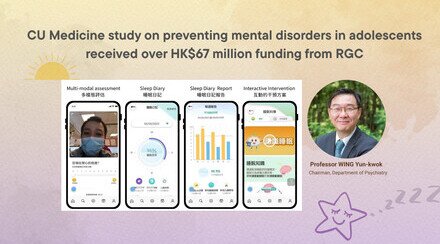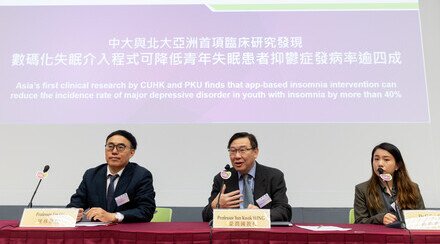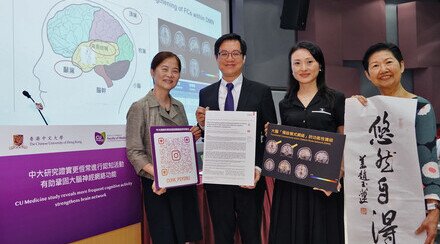CUHK supports World Sleep Day 2023 Calls for attention to adverse effects of sleep problems, including increased risk of long COVID, mental and cardiovascular problems
Sleep is fundamental and essential to human beings, affecting every aspect of our life. Widespread evidence consistently shows that inadequate and suboptimal sleep has numerous adverse effects on our health. A recent study by The Chinese University of Hong Kong (CUHK)’s Faculty of Medicine (CU Medicine), in collaboration with an international research group from 16 countries and regions, has shown that habitual short night-time sleepers have about twice the risk of suffering from long COVID compared to normal night-time sleepers.1 In light of World Sleep Day, the research team from CU Medicine’s Department of Psychiatry encourages people to obtain adequate sleep on a regular basis to promote optimal health. The World Sleep Society marked this year’s World Sleep Day on 17 March with the theme “Sleep is Essential for Health”. The aim of the event is to promote the idea that sleep is just like eating and exercising well, and that adequate sleep is foundational to our physical, mental and general well-being.
Habitual short night-time sleepers have twice the risk of long COVID
A research team from CU Medicine’s Department of Psychiatry collaborated with the International Covid Sleep Study survey (ICOSS) to study how the COVID-19 pandemic and infection reciprocally influenced sleep, circadian rhythms, daytime functioning and health in general adult populations1.

Professor Wing Yun-kwok highlights the importance of sleep hygiene to health.
About 17,000 participants responded to the survey, and the results suggested that among subjects who had been vaccinated twice at the time of the survey, short sleepers (less than six hours) exhibited a greater long COVID risk than normal sleepers. Habitual short night-time sleepers had twice the risk of long COVID compared to normal night-time sleepers. They were more prone to long COVID symptoms like sweating (1.73 times), joint and muscle pain (1.67 times), and shortness of breath (1.39 times).
Dr Rachel Chan Ngan-yin, Assistant Professor from the Department of Psychiatry at CU Medicine, said, “We know that vaccination may have a protective effect, reducing the development of long COVID . However, this protection may be less pronounced among those sleeping less than six hours per night. The findings further emphasise the importance of adequate and optimal sleep in reducing the long COVID.”
Persistent eveningness and insomnia are associated with greater risk of depression
During the COVID-19 pandemic, insomnia and circadian disturbance were also highly prevalent in both adolescents and adults. Individuals who presented with insomnia or what is known as an eveningness preference, meaning that they prefer a late bedtime, show an increased risk of daytime sleepiness and mental health problems at follow-up, according to a three-year longitudinal study by the Psychiatry team which was published in 20212.
Dr Joey Chan Wing-yan, Associate Professor from CU Medicine’s Department of Psychiatry, added, “Persistent eveningness and insomnia are significantly associated with greater risks of excessive daytime sleepiness and depression in adolescents, while both persistent and incident insomnia increase the risk of suicidal ideation. Our findings underscore the importance of addressing sleep and circadian factors in the management of adolescent mood and daytime functioning.”
Short sleep duration can potentially cause several cardiovascular diseases
The research team has also conducted studies that support the causal association between short sleep and cardiovascular risk. In a study the team published in 20213, they analysed a large database from the UK biobank, which included more than 400,000 participants. They found that short sleep duration (less than or equal to six hours) is an independent causal factor of cardiovascular risks, including arterial hypertension, atrial fibrillation, pulmonary embolism and chronic ischaemic heart disease.
Professor Wing Yun-kwok, Chairmanof the Department of Psychiatry at CU Medicine, concluded, “Our findings suggest short sleep duration is a causal risk factor for several cardiovascular diseases. It seems to be associated with the influence of sleep deprivation on cardiometabolic health through some common pathophysiological mechanisms, including dysfunction of the sympathetic nervous system, acceleration of metabolic diseases and atherosclerosis, increased inflammation, and cardiac dysfunction. Therefore, extending sleep duration among short sleepers might be a promising strategy to reduce the risk and benefit cardiovascular health. In addition, sleeping too long may reflect underlying physical and mental health problems that will need further attention and intervention. All in all, it is important to maintain a regular sleep-wake cycle with an optimal amount of sleep to improve health.”
On World Sleep Day, Professor Wing highlighted the importance of sleeping well as an essential behaviour for good health and gave the following healthy sleep hygiene tips:
- Maintain a regular sleep-wake pattern.
- Obtain optimal sleep every night.
- Avoid electronic media use near bedtime.
- Establish a comfortable sleeping environment.
- Maintain a bedtime routine (winding down before sleep).
1 Translational Psychiatry 13 (2023) 12:32 doi: 10.1038/s41398-023-02334-4
2 Journal of Affective Disorders 294 (2021) 533–542 doi:10.1016/j.jad.2021.07.033
3 European Heart Journal (2021) 42, 3349–3357 doi:10.1093/eurheartj/ehab170

Dr Joey Chan states that persistent eveningness and insomnia are significantly associated with greater risks of excessive daytime sleepiness and depression in adolescents.

Dr Rachel Chan says that habitual short night-time sleepers have a higher risk of developing long COVID than the normal night-time sleepers.






















